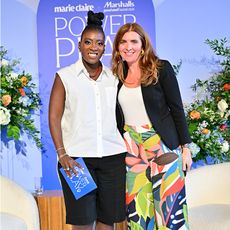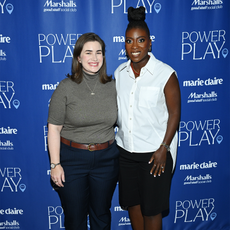Career advice
What you need to know to build a successful career, straight from Marie Claire editors.
Explore Career advice
-

Coach Sandy Brondello Breaks Her Silence on the Offers She Turned Down for Toronto
The WNBA history-maker sets the record straight on the whirlwind between her Liberty exit and her fresh start with the Toronto Tempo.
By Noor Ibrahim Published
-

Abby Phillip Wasn’t Looking for the Spotlight. She Earned It Anyway.
After writing her first book on Jesse Jackson’s legacy, the CNN anchor reflects on risk, resilience, and staying true to herself.
By Andrea Stanley Published
-

What You Really Need to Know About Networking and Building a Professional Community
Sponsor Content Created With Marshalls
An author and career influencer shares her advice.
By Marie Claire Editors Published
-

How to Recognize When It's Time to Pivot in Your Career
Sponsor Content Created With Marshalls
Three female founders weigh in on the power of making a pivot.
By Marie Claire Editors Published
-

5 Smart Money Moves For Financial Security
Sponsor Content Created With Marshalls
Top insights from author and finance expert Erin Lowry during Power Play Philadelphia.
By The Editors Published
-

How to Define Your Own Direction With Confidence
Sponsor Content Created With Marshalls
An inside look at day two of Power Play.
By The Editors Published
-

Melinda French Gates Knows Exactly How Her Career Ends
One year since the philanthropist left the Gates Foundation, she’s still figuring things out—but there’s one cause she’s committed to for life.
By Andrea Stanley Published
-

How Marshalls Is Helping Women Access the Good Stuff in Life
Sponsor Content Created With Marshalls
From in-person events to digital resources, women are gaining the support they need to create the lives they've always dreamed of.
By Anneliese Henderson Published
-

After Nearly 20 Years With Nike, Tania Flynn Walked Away to Build a New Legacy at Athleta
While it was a difficult decision, taking a leap of faith was exactly what Flynn needed.
By Lauren Tappan Published
-

How a Shared Fertility Struggle Empowered Two Ex-Nike Employees to Launch Their Own Prenatal Company
After nearly two decades, Vida and Ronit parted ways with Nike and channeled their personal hardships into a new mission-driven venture.
By Sara Holzman Published
-

Meet the Millennial Women Buying Their Own Engagement Rings
There's nothing wrong with it. So why does it feel so uncomfortable?
By Kristin Canning Published
-

The Most Interesting Pieces of Career Advice We've Ever Given
A look back at three decades of tips to help women get ahead at work.
By The Editors Last updated
-

They Got Everything They Wanted Professionally by 30. Then What?
Reaching an all-time career high at a young age comes with a lot to celebrate—and a lot of pressure, too.
By Halie LeSavage Last updated
-

Are Millennials Secretly Rich?
New data claims the generation is wealthier than previously thought. But why doesn't it feel that way?
By Abigail Libers Published
-

5 Steps to Money Mindfulness
Sponsor Content Created With TD Bank
It's simpler than you think.
By Eileen Ambrose Published
-

Work Wives Are Going Extinct
They're becoming less common as remote and hybrid work get more prevalent. But is now the time when we need them the most?
By Samhita Mukhopadhyay Published
-

Boredom Helped These Founders Build a Bathing Suit Brand
Laura Low Ah Kee and Shannon Savage left their executive roles to try something new.
By Sara Holzman Published
-

Former 'Marie Claire' Editors in Chief Reminisce About Their Time on the Job
In honor of the magazine's 30th anniversary, we asked them to share favorite memories and what they learned while at the helm.
By Nikki Ogunnaike Last updated
-

Ella Emhoff Never Intended to Be an It Girl—All She Wants Is to Knit
The second stepdaughter and former fashion model opens up about her true passions: art, knitting, and community.
By Emma Childs Published
-

3 Women on How They Unleashed Their Potential and Followed Their Professional Dreams
These inspirational stories will have you ready to leap into your dream life.
By Marie Claire Published
-

Runner Alexi Pappas On Chasing Something New
"I realized that where I was going had never been gone before. I needed to stop trying to define what this was."
By Nikki Ogunnaike Published
-

These Women Own Sports
Seriously, though. As interest in the WNBA, NSWL, and other female leagues grows, so too, do the number of women investing in pro sports teams.
By Mattie Kahn Published
-

What It Takes to Bootstrap Your Own Art Gallery in New York City
It took Lin Tyrpien more than a decade to find her calling. When she realized she wanted to run her own creative space, the real work began.
By Jenny Hollander Published
-

What It's Like to Launch a Bookstore in the Land of Book Bans
The Lynx opened in Gainsville, Florida as a foil to the state's legislation in support of censorship.
By Marie Claire Editors Published
-

How Moleskine's CEO Daniela Riccardi Inspires Dreamers
Learn about the trailblazer's approach to success.
By Anneliese Henderson Published
-

This HR Executive Used an Intensive Money Course to Bounce Back From Bankruptcy and Pay All Cash for a $76,000 Farmhouse in Rural Maine
Years later, renovations are still going, but the financial freedom has made it all worth it.
By Marie Claire Editors Published



